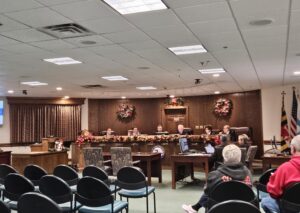
OCEAN CITY – A code amendment to allow habitable attic space will advance to a second reading without additional parking requirements.
On Monday, the Ocean City Council voted 4-2 to approve the first reading of an ordinance to amend the town’s zoning code. While the change would now allow habitable areas in the attics of residential dwellings, those in opposition argued that additional parking requirements were needed.
“For us not to address that, at least in the neighborhoods, I think is a mistake,” Councilman John Gehrig said.
In October, following a public hearing, the Ocean City Planning and Zoning Commission voted unanimously to forward proposed code amendments to the Mayor and Council with a favorable recommendation. The changes would define dormers and habitable attics, revise the definition of building height to allow habitable attic space, and amend the minimum number of off-street parking spaces to require one additional space for any enclosed loft or habitable attic in a single-family detached dwelling and one additional half space for any enclosed loft or habitable attic in multi-family dwellings.
However, when the proposed code amendment was brought before the Mayor and Council at a work session on Nov. 28, the added parking requirements were removed.
“The motion that passed at the work session struck those two changes,” City Solicitor Heather Stansbury said Monday. “So there’s no new parking needed.”
Back on the agenda for a first reading Monday, Mayor Rick Meehan reiterated his objections to the removal of parking requirements. While he noted the benefits the proposed change would have on development, he argued it could also leave neighborhoods to contend with additional parking challenges.
“When I look at our single-family neighborhoods in particular, the size of the houses being built, and now the additional space it wouldn’t require for parking, I think it creates an unnecessary burden on those areas,” he said.
Meehan said that rentals exacerbated the problem.
“Larger townhouses and single-family homes with more bedrooms are bringing more cars to neighborhoods. In many cases these larger properties are becoming or being built to specifically become vacation rentals,” he said. “Additional cars are flooding our streets and making these areas less desirable. Third-party rental platforms have changed the landscape, and I don’t believe we could ignore that.”
Meehan ultimately urged the council to place the added parking requirements back into the code amendment.
“I believe that the council wants to see development, and I think they want to see redevelopment, as do I,” he said. “But I’ve heard many times from council members that they want it to be quality and a development that fits with our community. I think the original ordinance as presented did that. I don’t think that section should be removed.”
Gehrig said he agreed with Meehan. He said the lack of parking requirements for habitable attics could impact neighborhoods.
“We are potentially making this worse,” he said.
Gehrig also shared his concerns about the proliferation of rentals in residential areas.
“I don’t know if I necessarily have an issue with this, or if I have an issue with rentals,” he said. “But the two of them are related, clearly.”
For his part, Councilman Peter Buas said other areas of the town code addressed parking. He argued that if attic space was converted to a bedroom, it would require additional parking.
“When it comes to zoning, as the zoning administrator said, if it looks like a bedroom and is used as a bedroom it’s going to require the space,” he said. “If it’s just a living space, it’s not going to require the parking space.”
Buas added that any rental property would require an inspection, which could address any parking concerns. He noted, however, that the topic of short-term rentals was better suited for January’s joint session between the planning commission and the Mayor and Council.
“I get the concerns with the short-term rentals,” he said. “I just want to make sure that we are adequately separating these conversations. All the concerns about short-term rentals are real and deserve a separate conversation when it comes to licensing.”
Stansbury said the council had two options – to include the added parking requirements recommended by the planning commission or to keep them out of the code amendment.
“If you want there to be a parking requirement for a habitable attic, then you would want what got presented to you on November 28,” she said. “If you don’t want there to be, you want what’s in front of you today.”
After further discussion, the council voted 4-2, with Gehrig and Councilman Will Savage opposed and Council Secretary Tony DeLuca absent, to approve the ordinance on first reading.
“I think if we had a major problem, we’d have a meeting full of people who are angry about parking in their neighborhood,” said Council President Matt James.

